TONY MARTIN - “BLACK SABBATH Was Hard Work”
February 11, 2022, 2 years ago
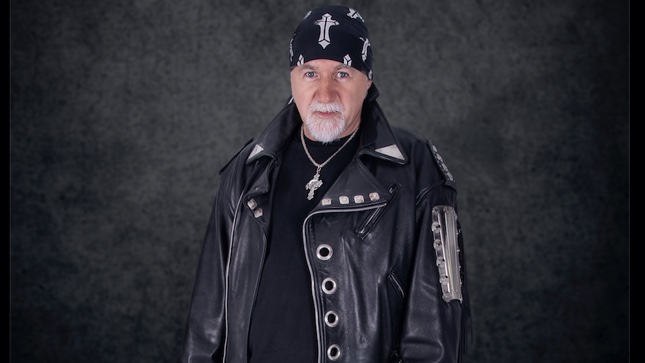
BraveWords had the honour of speaking to former Black Sabbath singer Tony Martin recently about his excellent new (and best-selling!) album Thorns, out now via Dark Star Records. Tony Martin debuted on 1987’s The Eternal Idol and went on to record four more studio albums in total including 1989’s Headless Cross, 1990’s Tyr, 1994’s Cross Purposes and 1995’s Forbidden. For collectors, his era of Black Sabbath has been extremely hard to acquire, even via streaming services, although after our conversation he revealed (here) that a new record deal has been signed.
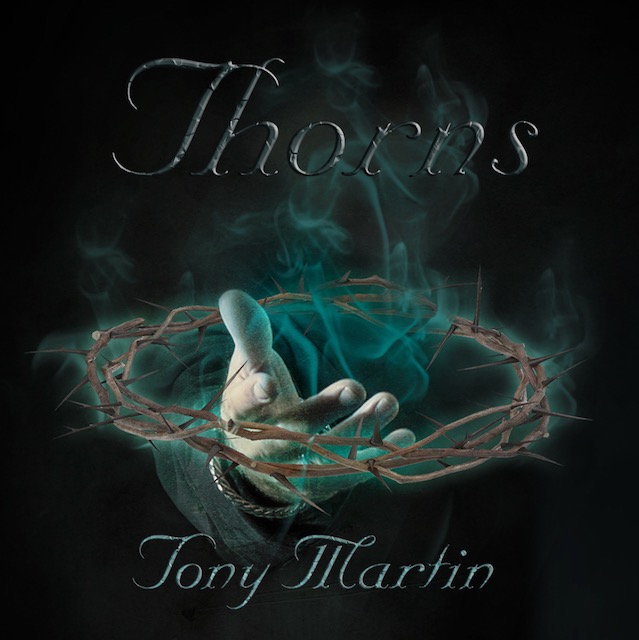
Here is the conversation that aired first on Streaming For Vengeance a few weeks back.
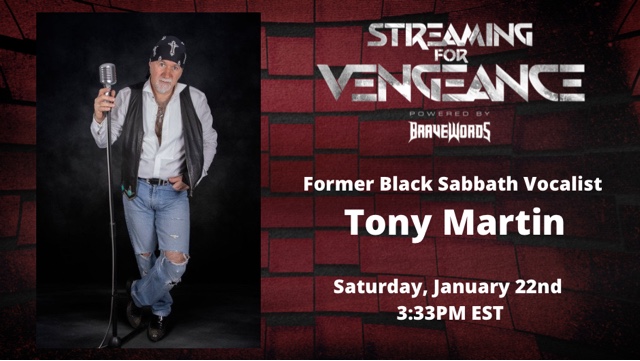
BraveWords: It is most certainly an honour and a privilege because there is only one former Black Sabbath singer who I haven’t met and spoken to, and that’s you.
Martin: “Cool. Thank you very much, I appreciate it. We need you guys, you know, so it’s a pleasure to talk to you.”
BraveWords: Well, it sounds like these days we all need each other.
Martin: “Indeed. And I say this quite often, but I think that music is the light in this dark period that we’re in, for a lot of people. If you’re stuck indoors and can’t do anything, I think music is a great thing to have in your toolkit.”
BraveWords: You can say that again. We have been wanting and yearning to hear your voice for a long time, and you really came out of the gates. I think I still have two black eyes from when you unleashed ‘As The World Burns’. With this whole COVID mess, I gather that this album Thorns had been done for a long time?
Martin: “Kind of. It was started a long time ago. It’s taken me ten years, which sounds ridiculous, I understand. But along the way, if I explain, my life actually has been in the studio for the past 25 years, writing, recording, doing guest appearances and stuff like that. So, in my world, what happens is that when some work comes in, I work on that and the solo album gets put to the side. So it kind of got stretched out, and it also evolved over the years as I met Scott McClellan, the guitar player, it kind of changed feel and went in a much heavier direction than it started off. It’s been a long time coming but I’m really pleased with how it’s turned out.”
BraveWords: Now, did the whole COVID thing phase you when you were trying to put this thing together and to bed? Did it screw your head up a bit?
Martin: “It’s a strange thing because like I said, my career is spent in the studio, so not much changed. I’m still in the studio, it’s not like some bands who really suffered from not touring. Whereas me, I’m here in my studio. So, that aspect of it wasn’t too difficult. However, when the other players were recording their parts, they had to record it wherever they are, around the world. We have the technology these days, where you can send the music files over and install it into a track later on. So we managed to set up a system whereby we could work live over the internet. So that part of it didn’t really affect me. For us anyway, we have a vulnerable family. My parents are like, 90 years old, so for us it’s important to do the vaccinations, and the masks, and shut the door - that’s important for us. Other people have different ways of doing their thing. It matters to us and we’re happy to do all that, and because I’m still in the studio I didn’t really have to go anywhere, you know?”
BraveWords: Right. Now, I’m such a big fan, and there’s so many fans out there who were just waiting to hear your voice again. Did you feel that external pressure? That you had to deliver the goods?
Martin: “Oh man. It’s a really weird thing. This is the most Tony Martin album there has ever been. It’s the one where I was able to let loose, and let the whole thing kick up and fly. So, in that respect no, there wasn’t any pressure. But I’m seeing all of the kind words that people are saying at the moment and I’m just thinking, ‘Whoa, I hope I’ve done it justice.’ I really want everyone to like it. You can never really know ahead of time. So you do your best and hope. But so far, everything has been fantastic and great words have been said about it, so it’s really cool. Not really much pressure in that respect, no.”
BraveWords: If your pipes were fried, if your voice was gone, I don’t think you’d see all these beautiful remarks, because it’s not. Time has been on your side.
Martin: “Kind of. Although I must say I’m down about five notes from where I used to be in Sabbath. I’m singing in a new range these days. I’m genuinely this old, this is not fake colour! You body changes as you get older, so my voice now is about five notes down from like top D or something like that, but it works. I’m using it as it is at the moment, this new range that I’m singing in now. It’s working and I’m happy with it, so let’s run with that!”
BraveWords: Are you saying that you’ll be heading toward a death metal style in the future?
Martin: “I don’t think it’s going to go that far.”
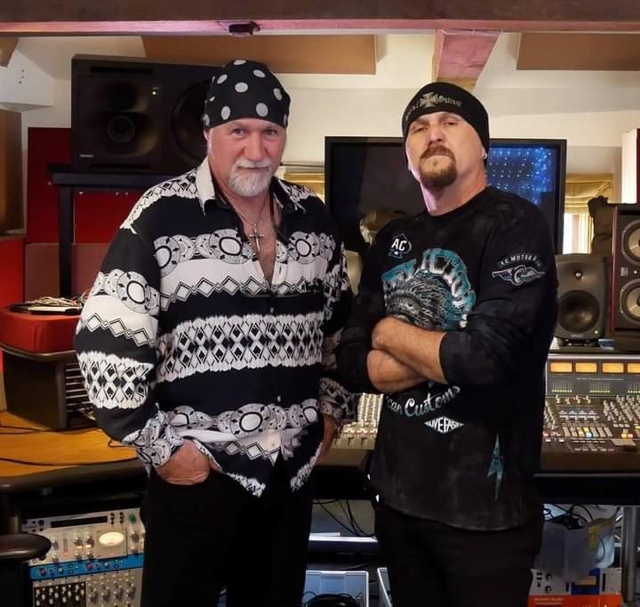
BraveWords: I had the most wonderful chat with Scott (McClellan; watch here) a couple of weeks ago, talking about his project Breed Of Aggression and of course the Thorns record. But talk about the players, you’ve surrounded yourself with some stars.
Martin: “Yeah, although I’ve got to say they’re all friends. There’s no strangers to me on this. They’re people that I’ve known for many years and worked with before, and more importantly people I trust. It’s like a little family. I’m happy, and kind of lucky, to be able to call these people and say, ‘Do you fancy doing something?’, and they say, ‘Yeah, sure!’, and then they jump in. It’s just a great feeling to have those kinds of friends around you. I am very honoured, really.”
BraveWords: Now, let’s dive into the record a bit here, what was the decision with unleashing As The World Burns? Because you really did knock our socks off. It was heavy as hell, man.
Martin: “Yeah, it is and it’s the first one that I got together with Scott. I actually met Scott on Facebook, that was something like 12 years ago, and it just struck me, the guy is really cool with guitar riffs and in some ways it kind of reminds me of Tony Iommi in the way that he just comes out with his stuff, it’s just so prolific, and keeps firing them at you. I really enjoyed that. It was easy to work with Scott in many ways, reminds me of a younger Iommi in some ways. He’s not a massive solo player, but the stories he tells with his guitar is really cool, and he lets me cut it up to where I want it to be, a verse here, a chorus there, he’s great like that. I was really able to make it fit my voice and fit in with what I wanted to do. It’s all good, I can’t say any more great words about it really.”
BraveWords: He was weaned on Dimebag Darrell, and obviously you’re familiar with Pantera, but did you follow any of that extreme stuff at the time, in the ’90s?
Martin: “No, mate, if you could see inside my head I think you’d scream because it’s like a nightmare in there, it’s just so full of all different styles of things. What I said to Scott was, ‘Okay, I’m going to have to make this sound like Tony Martin, it is my album after all, it’s what I’m selling.’ He said, ‘No problem, just do what you want to do.” So I am one for melodies and stories, that’s what people know me for, and I set about it in that way. So, everything that he threw at me, as heavy as it was, I put a melody over it and put a story on it, and that’s how it ’s turned out like ti has. It’s been a really good adventure.”
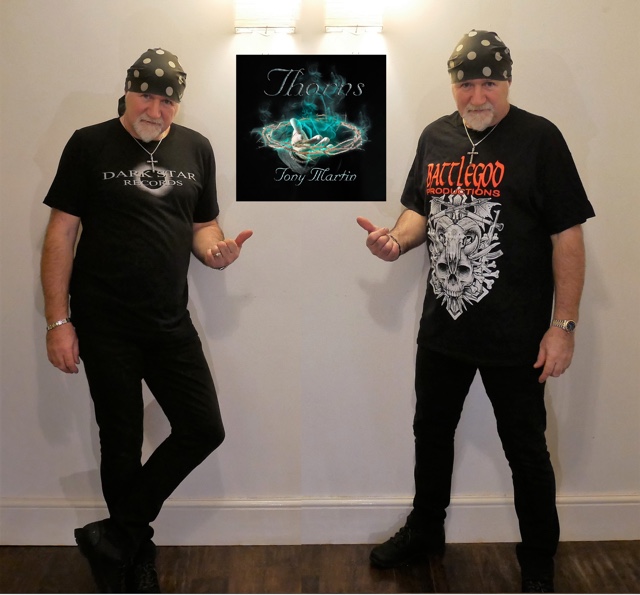
BraveWords: Can we talk about some other standout tracks? For example, ‘Book Of Shadows’ is so epic, and very spiritual.
Martin: “Yeah. That’s where it started though, the album was called Book Of Shadows, and I have to say these three unplugged acoustic-like tracks they all have a heavy version to them, but I’m a guitar player as well, at heart, and the first thing I do when I’m writing is pick up an acoustic guitar. When I played it on acoustic, I thought, ‘You know what? This actually sounds good.’ I did try to get Damnation removed because I didn’t think anybody would fall for it, but everybody’s on board with the fun kind of aspect that it is. It needs a video to explain how that song works, but yeah it was just a real joy to work with.”
BraveWords: When I first heard ‘This Is Your Damnation’ I thought it was the "Ice Cream Man" for the apocalypse.
Martin: “Oh, amazing. I honestly don’t know what came over me. What can I tell you? It was just one of those things. I couldn’t get rid of it. I don’t even know why I wrote it, it just came out. I played it to the labels and they were like, ‘Oh, that’s cool’, and I thought, ‘Really?’ It kind of stuck and now everybody’s saying it’s not that bad and they understand where it’s coming from. But really it needs a video to explain it, because it’s basically a guy thinking, so the voice you’re hearing is the voice in his head. It needs to be portrayed in that way so that it makes sense. But I’m loving it, it’s all good.”
BraveWords: Are there thoughts on video number two? And any idea what that would be?
Martin: “Yes, there are thoughts. The only thing is the COVID thing which really stops us from getting together to actually construct things. We can use green screen, we can use other techniques in video, so it’s not all dead. We have some ideas cooking and I think it’s important right now because we’re not going to be able to really tour with this just yet. So we’ve got to use the other tools we have and create things, such as yourself supporting us in this. Videos and stuff like that, that’s how we will have to promote this one for now until we get the opportunity to get back out there.”
BraveWords: Before we continue to talk about touring, I just wanted to get your comments on the whole Queensrÿche / Sister Mary connection. How did that come about? Because Operation: Mindcrime is certainly on my shortlist of greatest albums of all time and Pamela Moore has a big part in it.
Martin: “Yes. Pamela and I have known each other for a few years on Facebook, but I’ve never met her. We have this little thing on Facebook where we have exactly the same birthday, so each time our birthdays come up we have this little battle of ‘You’re my brother from another mother’, and ‘You’re my sister from another mister’, and stuff like that. We have this distant thing. The song that she sings on is the title track, ‘Thorns’. If I can just explain a little bit about the song, the character in Thorns is a woman who’s been abused quite badly and she self-harms, you know when people cut themselves and stuff like that, and she’s covered in scars. So much so that she can’t bare to speak to anybody and when anyone says a word of kindness the words feel like thorns sticking in her, she can’t stand being helped or anything like that. I couldn’t sing that part, I needed a girl singer. So I started thinking about it and really quickly Pamela’s name came up, and I thought, ‘Of course, Pamela Moore, why not?’ So I got in touch with her and I asked, ’Do you fancy singing…?’, and her answer was ‘Yes!’ It was like, that quick. She didn’t give me a chance to ask her, ‘Don’t you want to even think about it?’ So it was really cool. And she really put that part across really well. I’m grateful to her for doing that. She did a great part on it. It was really cool to have her on board.”
BraveWords: Do you think with this record that you’re getting back to where you belong? (I hold up his Back Where I Belong album).
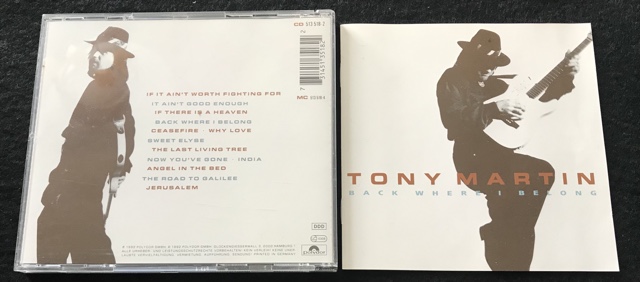
Martin: “No. (Laughs) No!”
BraveWords: This is a hard CD to find. Do you feel this is back where you belong?
Martin: “It’s been a strange journey. As I said to you, inside my head, it’s a curse inside my head. It doesn’t allow me to stand in one place for too long. However, if I’m allowed to mix stuff together, like I have been on Thorns, it really sits well. But on Back Where I Belong, the one you have just there - that was me trying to be the 1980’s pop/rock dude. It was okay, but it didn’t really sort of fly. After that one was an album I did called Scream, and that one was getting a little bit heavier at that point, but it still wasn’t really hitting the mark. But Thorns really has touched the Tony Martin that I like being. If I’m allowed to experiment and explore and do all of these different styles, I think it really works for me. And at the moment my voice is really in that zone so it’s all worked out quite well. It’s a world away from Back Where I Belong.”
BraveWords: It’s a wonderful record though, and there’s a lot of stars on it.
Martin: “Yeah. I’m fortunate that throughout my short career I’ve been surrounded by great people and well-known people as well. You have to say that Black Sabbath is the reason people found out about my voice, so there’s a lot of be said for the Sabbath days. But I have been able to carry that voice forward in many ways, and I’ve dome many sessions and guest appearances, I think I’m on about 75 albums now for guest appearances for this, that, and the other. And so it’s enabled me to work, to keep working, which everybody needs to do. But now is the right time for this I think, for this solo album of mine, Thorns.”
BraveWords: How hard is it to step away from the stigma of being the “former Black Sabbath singer”, and just have your own identity as you just said?
Martin: “In one way, it’s impossible to step away. But once you’re in that box, nobody really wants you to do anything else. They need to sell you for what you are known for, that’s the whole idea of record sales. If you’re good at something, that’s what you concentrate on. The problem they have with me is that my head goes all over the place. It’s sometimes hard to tie me down into one particular place. In that respect it’s almost impossible to escape the Sabbath thing. And people such as yourself need to talk about Sabbath because that’s where I came from, it’s what people know me for. However, I don’t go around telling people, ‘Do you know who I am? I’m the ex-singer for Black Sabbath’, it doesn’t work like that. I can still go to the shops and buy shit and nobody knows who I am. I don’t live my life like that, but in the profession it haunts me, it’s the kind of thing that comes with me.”
BraveWords: But it’s a hell of a thing to have on a resume, obviously.
Martin: “Yeah. I don’t have much to complain about in that respect. Black Sabbath was hard work. Mostly because there was such a separation between us. I’m 12 years younger than the rest of the guys in Sabbath, so our circle of friends was different and the way that we worked is different. They had 12 years, at least, of experience ahead of me, which I could never really keep up with. They were always that much experience away from me. So it was hard work in that respect, but Sabbath has given me a name which I have to be grateful for. But I did the best I could while I was there. I think people are starting to sort of pick up on the Tony Martin here even though it’s not out there for sale, they are still finding it.”
BraveWords: Are you comfortable talking a little bit more about Sabbath?
Martin: “Depends what you ask me.”
BraveWords: Let’s be frank here. Ozzy was fired. Dio resurrected the band, but their label (Vertigo) wanted Ozzy to the point that they refused to pay the studio expenses for Heaven And Hell. Deep Purple’s Ian Gillan replaced Dio during a drunken binge with Tony Iommi and Geezer Butler. Glenn Hughes took the mic for - what was supposed to be an Iommi solo album - Seventh Star. Hughes gets fired during the tour and future Badlands singer Ray Gillen gets hired. Eventually you replace Gillen and the stunning Eternal Idol album is born. So, the question is, was anybody really in charge (laughs)?
Martin: “Let me tell you, it’s a fascinating question. And it would take us longer than we have time for here, but Tony Iommi went through six or seven managers that I was involved with, basically, and it got a little bit like Spinal Tap, with all the managers and the band things that were going on. The different changes, the different members and stuff like that, and it was really hard to keep up with. When I started, it was actually 1986. Tony’s manager then was Patrick Meehan and he put me on standby because he had a problem with Glenn Hughes on the Seventh Star album, I don’t really know what the issues were. But they put me on standby then, and I was scared stiff because I can’t sing like Glenn Hughes - nobody can sing like Glenn Hughes - only Glenn Hughes can sing like Glenn Hughes. So was scared to death and then they got it sorted with Glenn, and Ray Gillen stepped in, then he left and went to Blue Murder with John Sykes, and they put me on standby again. And then they said, “You better come down to the studio and try something.” So I went down, and I got the job. So it was like from nowhere to being the frontman of Sabbath in weeks. Unbelievable speed. So you think it’s nobody in charge, but it’s the way the band evolved. Once that happened, it led to something else, which led to something else. With Sabbath it’s a constantly changing, evolving story. Fascinating. For fans and people like yourself who are into that side of it, it’s just such a story to tell, there’s so much in there, it’s amazing.”
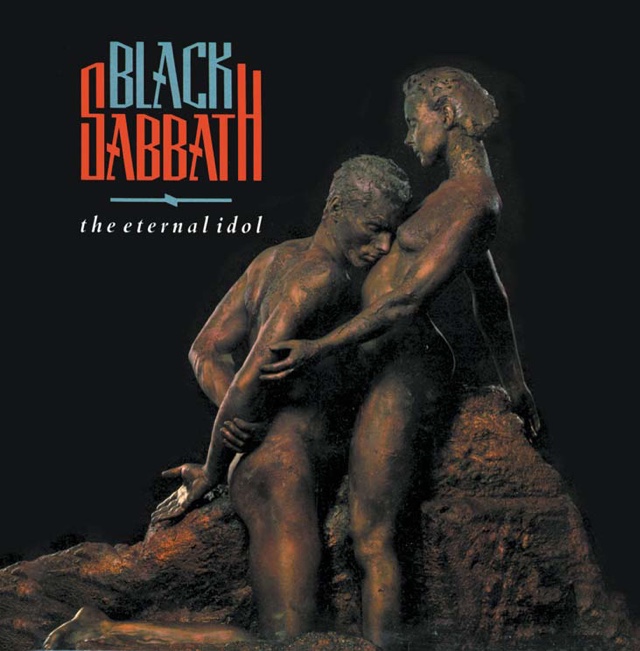
BraveWords: But with you watching the revolving door, or maybe you weren’t, the incredible press - when I read stories about Heaven And Hell, Warner Bros. said, “No way, you’re not getting a penny from us, we want an Ozzy record”, but they went on with Dio. That must be obviously big shoes to fill and incredible pressure.
Martin: “It is. I don’t know what the conversations were because I wasn’t there. But I know from Geoff Nichols who sadly is dead now, but I’ve got Geoff on video talking about it. Dio went through the same shit. When he took over from Ozzy, Dio had all sorts of derogatory comments and things against him in the beginning, so he had to go through it as well. Every singer who’s gone through Sabbath has had to go through stepping in somebody’s shoes, to the point where once I’d finished with Forbidden, I didn’t think they could have gone anywhere else but back with Ozzy. I mean, I had heard they were doing it, but they were saying, ‘Oh no, it’s rumours, it’s rumours.’ But I think it was the only move they could have done and it was great move, I think, to go back with Ozzy in the end. Yeah, it is a revolving door. That comment you said, it’s very true.”
BraveWords: Were you an Ozzy fan? Were you a Dio fan? Were you paying attention? Were you a hard rock fan? Were you watching and listening?
Martin: “When I was a kid, 1971 turned it all around for me. There was so much going on in 1971, especially from England. I don’t know how we produced so many acts from such a little island. How did all that stuff come from there? But it was, it was all over, and I was into it all. I started to focus on the more technical stuff, like Jethro Tull, Yes, King Crimson, and that kind of stuff, and then eventually Rush and people like that. When I was a kid, like 15, I didn’t even like Black Sabbath. I took my first girlfriend to see them and I just thought it was horrible. So, honestly, I had to learn what it was. And you don’t understand, once you’re in the band you get to learn what it is, and then it’s like, ‘Ohhh! Yeah! I see what it is.’ And once you find it, it’s stunning. It’s absolutely stunning. The stuff that Iommi does is just incredible. The grace that he has and the power it has, the melody that it has, it’s just amazing, it really is. I wish I had taken more notice when I was younger, but at the time you know, you think you’re clever and it’s ‘Oh, I like techno-rock and that sort of stuff’, but it was under my radar for a while.”
BraveWords: But they talk about Hendrix, obviously, and the passing of Van Halen - but Iommi is right there, and for you to actually work with maybe the greatest guitar player of all time, especially when it comes to heavy riffs. Describe that relationship.
Martin: “Well, he’s written the story, hasn’t he? Tony Iommi, he’s written it. He’s at the top of his game and I respect that and I know that. It’s not like you’re walking around in awe with your jaw on the floor every day, but you know. You know you’re in the company of a great person, a special player as well that has given us such stuff and is still doing it. I went around to his house and he played me some things and fuck man, he’s still able to create these sounds and stories with his guitar. It’s a great thing, And I think people like Scott, they can come up. If Scott concentrates and goes with what he’s good at, I think he’s going to be somebody to look at in the future. At the moment he’s relatively unknown but I can see him doing some more stuff yet.”
BraveWords: I find it a shame with your career with Sabbath is hard - nearly impossible - for collectors to find. Do you and Tony ever revisit the catalogue?
Martin: “It’s not for sale at the moment. It’s not even on the catalogue, they don’t even have a record deal, the Tony Martin-era Sabbath stuff. It hasn’t been on sale for many years. So if you find one it’s either residual stock that’s been found in the back of a store somewhere or it’s second-hand copies that people are selling. I don’t get paid from Sabbath because it’s not on sale, and you don’t get royalties unless it’s being sold, so I’m awaiting as much as everybody to see if it will get re-released. And he did sort of say back about four years ago that we might be able to do something, then the phone went dead. Then months later I sort of contacted him and he said, ‘Come out to the house and I’ll talk to you about it.’ I went over there and he said, ‘We can’t do it. We just can’t do it. We can’t have anything new under the name of Black Sabbath.’ It can only be under the name of whatever is already existing. So, I left it with him, and then the phone went dead and I haven’t heard a thing since. You probably know more than me, to be honest, about what is going on. But I hope he gets around to re-issuing the albums and then people will be able to get hold of it. For now it’s just not out there, so you’re going to find it difficult to get your hands on.”
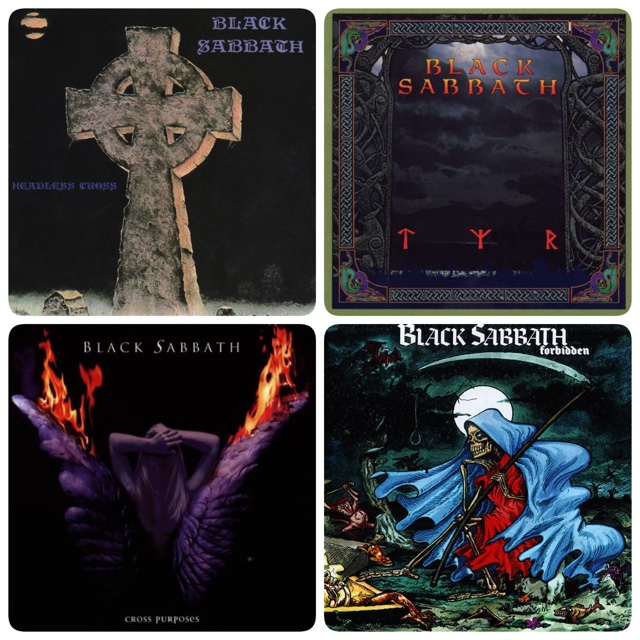
BraveWords: What did you think when you heard about Ray Gillen’s death in 1993 and Dio’s tragic passing in 2010?
Martin: “You know, what? When people have a talent and they touch your soul, touch your heart, your existence, you invite them into your house, don’t you? You go to work with them and you put them in your car, walk around with them on your headphones, stuff like that. So they become attached to you, and when they go, it’s quite a personal jolt. You do feel like you’re missing somebody that’s become close to you. I think that just shows you the power of music and of the artists, that connection they have with the fans. So, like everybody else, I was so sad really to lose these people. Ronnie’s just known for one of the best vocal things, nobody can touch that, nobody can take that away, it’s just fabulous. Ray Gillen was a little bit lesser known to me, but hey I went to see them when Sabbath had Ray on stage. Another great singer and it’s sad that he left us. We’re coming to an age that - this actually is a real colour, I haven’t painted it, I am old and so I can remember.”
BraveWords: I know!
Martin: “No, you’ve got more hair than me! This is a real colour, and I can remember these artists from way back. We’re starting to lose then now, aren’t we? Every year we seem to lose more and more people. It is sad, but haven’t they left us with something? I feel like we’ve been left like a gift, or I don’t know. It’s really cool, but not cool at the same time.”
BraveWords: Now your shirt (Tony is wearing Motörhead) because you remarked about mine (I’m wearing Cross Purposes); on February 13, 1994, Black Sabbath, Motörhead and Morbid Angel played Toronto. Being a big black/death metal fan, I’m just wondering what your dressing room conversations would have been watching the openers. Like, ‘look what we started’!
Martin: “Again, Morbid Angel, they weren’t on my radar, so they were new to me when they sort of hooked up with us. But great, I’m into everything so I can appreciate what they were doing. Was it your thing before or was that when you found them as well?”
BraveWords: Oh no, I’d heard about them for sure, from the first record, Altars Of Madness. But it was kind of an odd billing.
Martin: “Right. And it was new to me as well. I was like, ‘Whoa! Okay.’ But the guest bands were not really of our making. The management kind of hook up and reach out to see who’s available, and if one band isn’t available they’ll choose somebody else. But the main band for us at the time was Motörhead, and then we had various other guest bands along with us. We had no input really into who was going to be there.”
BraveWords: It’s all ticket sales, right? Getting different demographics.
Martin: “Indeed. You choose your territory and stuff what goes into the show, according to the band.”
BraveWords: Do you keep much memorabilia from that era?
Martin: “Not much, but I have a little. And you know why? I gave it all away thinking I was going to get some more. So I ended up with a few things here and there, but I should have kept it. But I’ve already got two of those Cross Purposes shirts, one was a hoodie.
BraveWords: You keep talking about age. Do your ageing bones yearn to get back out on the road when you can?
Martin: “I would like to. I have to say, because I’ve been a studio career person for the last 25 years, I don’t have a band. I have to hire musicians to come out with me, and that depends on if they are available. Sometimes a promoter will find you a band, but maybe you only get one rehearsal and then you’re on stage and nobody knows each other and stuff. For me, it hasn’t been a great thing, live. I wish I’d kept a band and it’s one of my regrets that I wasn’t able to keep a band sort of going through that period. If I go out on the road it’s going to have to be from scratch, getting everybody together and rehearsing it, getting a show, doing the whole thing right from the very beginning. It’s not like I’ve got something to start with. So it’s difficult, however, we can’t actually plan anyway. The COVID thing kind of stops you from planning. Even if my country said, ‘You can go’, your country might say, ‘No, you’re not coming here.’ So we can’t plan anything. I can’t see it being this year. I’m not sure about next year. So it’s going to be a while away. In the mean time I’ve said to the label, ‘If we do this, it got to be done right.’ The problem I have is, if I assemble a bunch of guys, it can look and sound a little bit like a tribute act if you’re not careful. And Sabbath deserves attention and certain stuff needs to be done in a certain way, so it can’t just be thrown together. It has to be thoughtful and done in the right way. So, I would like to get back out there but it will take time.”
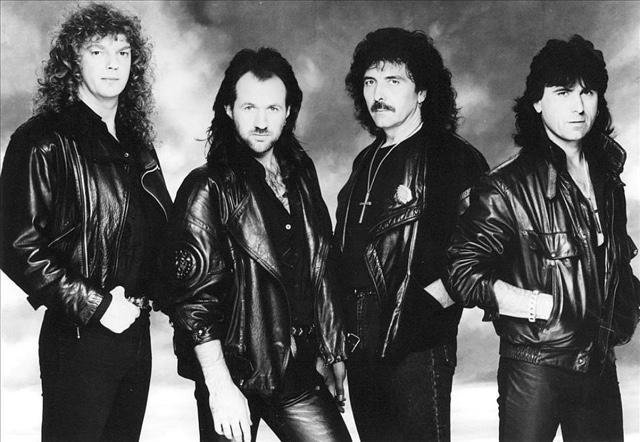
BraveWords: And without insulting any of your current players, who would be some of your dream players to perform with? Alive or even dead? You say you were a Rush fan would you have liked to have played with the late Neil Peart?
Martin: “Yeah. God, what a player. Dear Lord. You know, I love bands like that. I am so open minded as far as music goes. I like Green Day. And Foo Fighters.”
BraveWords: Dave Grohl rules, absolutely.
Martin: “You know what I mean? I can really appreciate all that stuff. But at the same time Cozy Powell was fantastic to work with, and he really understood the process of song writing and he would play with the vocals, and accent certain things, that was really cool. There are so many players out there that are so cool, it makes you wonder. Sometimes I walk down the street and I see someone playing on the street and I think, ‘How have you not got a record deal?’ Just really great stuff. But it’s like that, that’s what the business is like. Your talent isn’t a guarantee of being well-known or famous. It’s sometimes by chance that you end up in these situations, I do understand that, but most of the players that I know or have worked with in the past they’re all worthy of their place. I mean, some names have been put forward, but I think the guys on the album would - I haven’t decided - would probably be the first choice. Possibly.“
BraveWords: Do you remember the first time the door of opportunity opened? The first time you thought, ‘Wow, I can do this as a career.’
Martin: “Well, yeah. It has to be the Sabbath days for sure. Because before that really I wasn’t doing much, just doing local bands, like nobody really. I don’t know how to explain it. What would you do if you suddenly got a job with Black Sabbath? I mean what would you do?”
BraveWords: I would shit my pants, because it definitely takes a certain personality to own a stadium. To own 20,000 people every night. I can’t even imagine.
Martin: “I couldn’t imagine it either. But I had to learn really fast. That was an eye-opener and that was the opening of my professional career. I have to say the Eternal Idol, or the ‘Eternal Idiot’ as we call it - do you want to hear the story behind that?”
BraveWords: Absolutely!
Martin: “So, we’d been on tour and we came back home, and we went to Tony Iommi’s house. He had a gardener and it was an Irish dude. Now, we walk in through the gate and this Irish dude said, ‘Tony! Your new album, the Eternal Idiot, I fucking love it!’, just like that. Tony turned to me and said, ‘Did he just call me an Eternal Idiot?’, and I said, ‘Yeah!’”
BraveWords: That’s priceless.
Martin: “So we always call it the Eternal Idiot. Anyway, the Eternal Idol was the album that introduced me to Black Sabbath, and that gave me a buffer because I didn’t have to write anything and I didn’t have to create any of the melodies, that was already written by the time I got there. So that meant I could just sing. And in that process, by singing what was already there I was able to learn, I mean I had to learn fast, but I was able to learn about being in Sabbath. So, from a standing start being nowhere, to being the front man of Black Sabbath, I had this little window where I could gather as much information as I could and put myself into the spot. But like I said earlier, they were 12 years older than me and way in front and it was hard to keep up with them, but I did what I could, and my voice was in my favour so it carried me along, if you like.”
BraveWords: What was the first Sabbath song you sang, and do you remember the first moment when you went, “Wow, I’m on stage with Black Sabbath”?
Martin: “Yeah. Well, it’s a little bit crooked because when they put me on standby in 1986 they sent me a copy of the Seventh Star album and told me to learn it, which scared the pants off me because as I said I can’t sing like Glenn Hughes. So, that was scary, trying to learn those Sabbath songs. But then, actually doing it, the first one was actually in the studio. They called me up and said, ‘Come down and have a run-through of some songs, let’s see if we can make this work.’ And the first song was ‘The Shining’, off of Eternal Idol. Then they sort of sent me away and two days later they called me and said, ‘Okay, you’ve got the job. You’re got a week to record the whole thing.’ That’s seven days! Shit, they’d been in Montserrat for a year and a half, why couldn’t the message go there?”
BraveWords: You know what they were doing, they were rewinding to the first Black Sabbath album where it was recorded in ten days or something, so they wanted to put you through the same test!
Martin: “Mate, honestly, my whole experience with Black Sabbath is highs and lows. It’s like sometimes it’s fantastic and other times it’s really shit. Like I said, I don’t have much to complain about, that’s not what this is about. It was hard work, but it did put me in a favourable place. I am grateful for that. But life moves on and here we are doing Thorns. I’m now at a happy place, in the right moment, I think. I’m hoping so.”
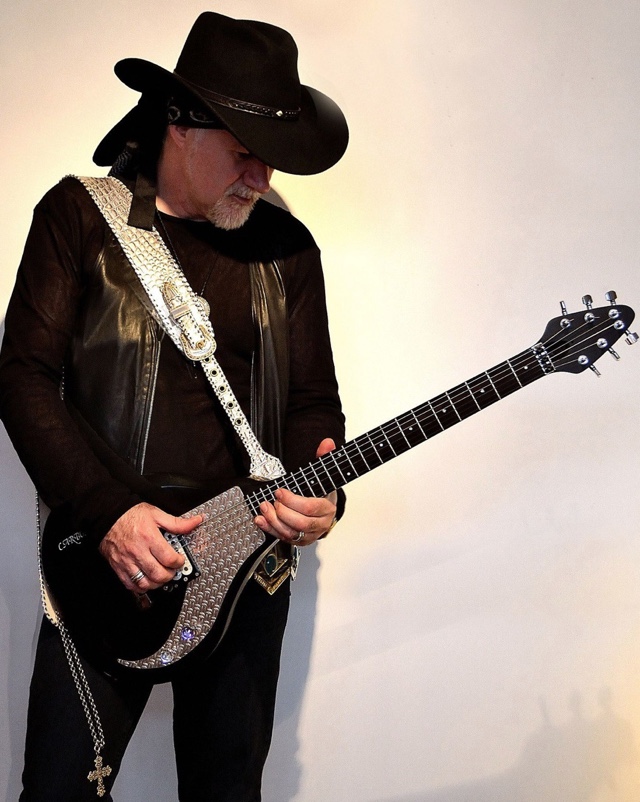
(Tony + Scott photo by Rob Billingham)











